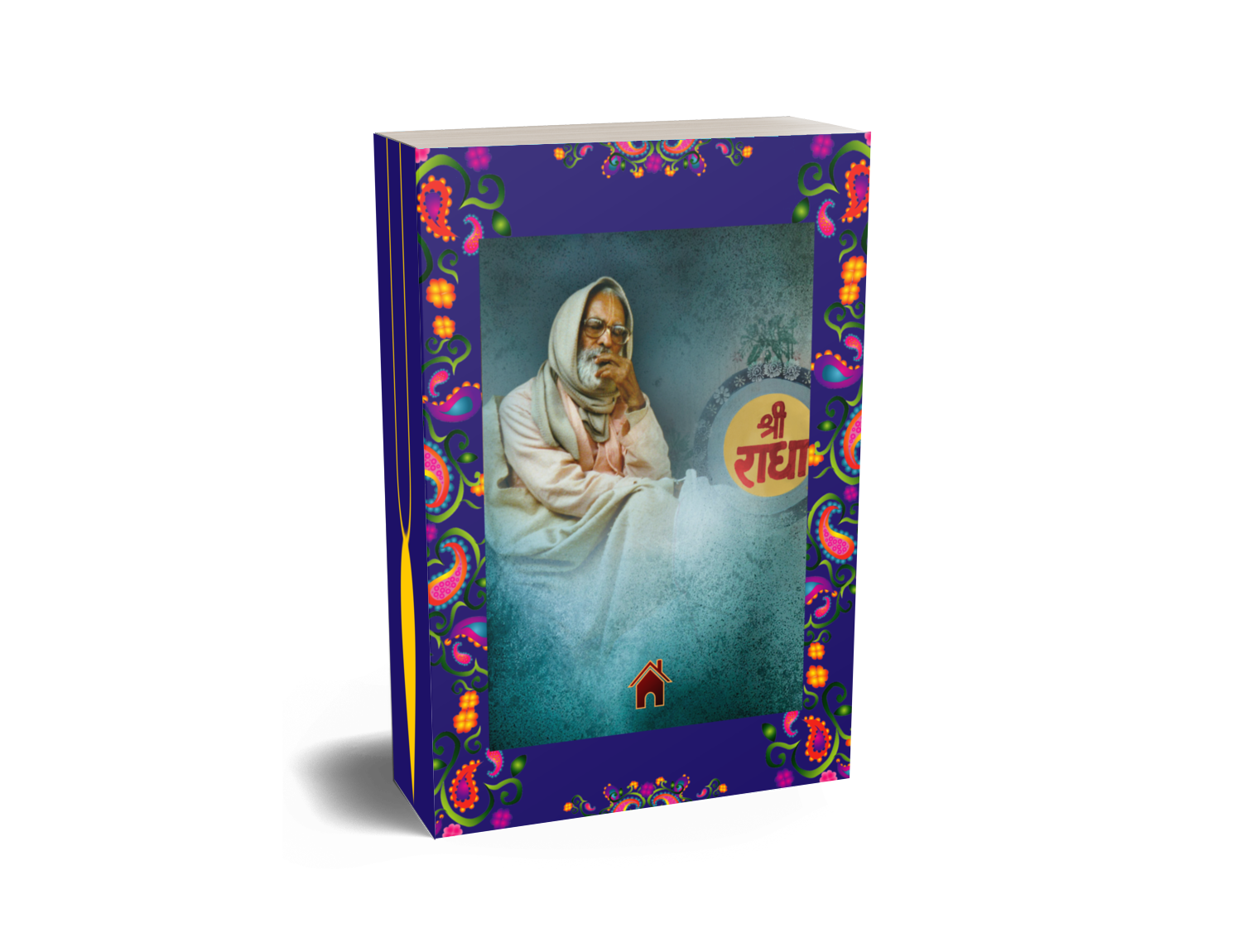

The following discourse on Śrī Bhajana Rahasya was delivered by Śrīla Bhaktivedānta Nārāyaṇa Mahārāja in Birmingham, UK on June 16, 2003
We have finished discussing the first yāma (stage) of bhajana – śraddhā – what it is and how to achieve it. Try to achieve transcendental śraddhā, the essence of that first yāma.
Corresponding to the first yāma of bhajana, the first sweet pastimes in Śrī Kṛṣṇa’s day are those of niśānta-līlā, the last part of the night. Śrīmatī Rādhārāṇī and Śrī Kṛṣṇa are sleeping and Śrī Vrnda-devī fears, “Now it is is going to be dawn.” She thus orders all the birds, like Śuka, Śārī and others, to sweetly sing the glories of Śrī Kṛṣṇa so that He and Śrīmatī Rādhārāṇī will wake up and return to Their homes. This is the first yāma pastime of Śrī Kṛṣṇa, and the first yāma pastime of sādhana-bhajana is śraddhā. If there is no śraddhā, there is no bhajana.
Nowadays I see that devotees have so many problems, and because of these problems, they cannot chant 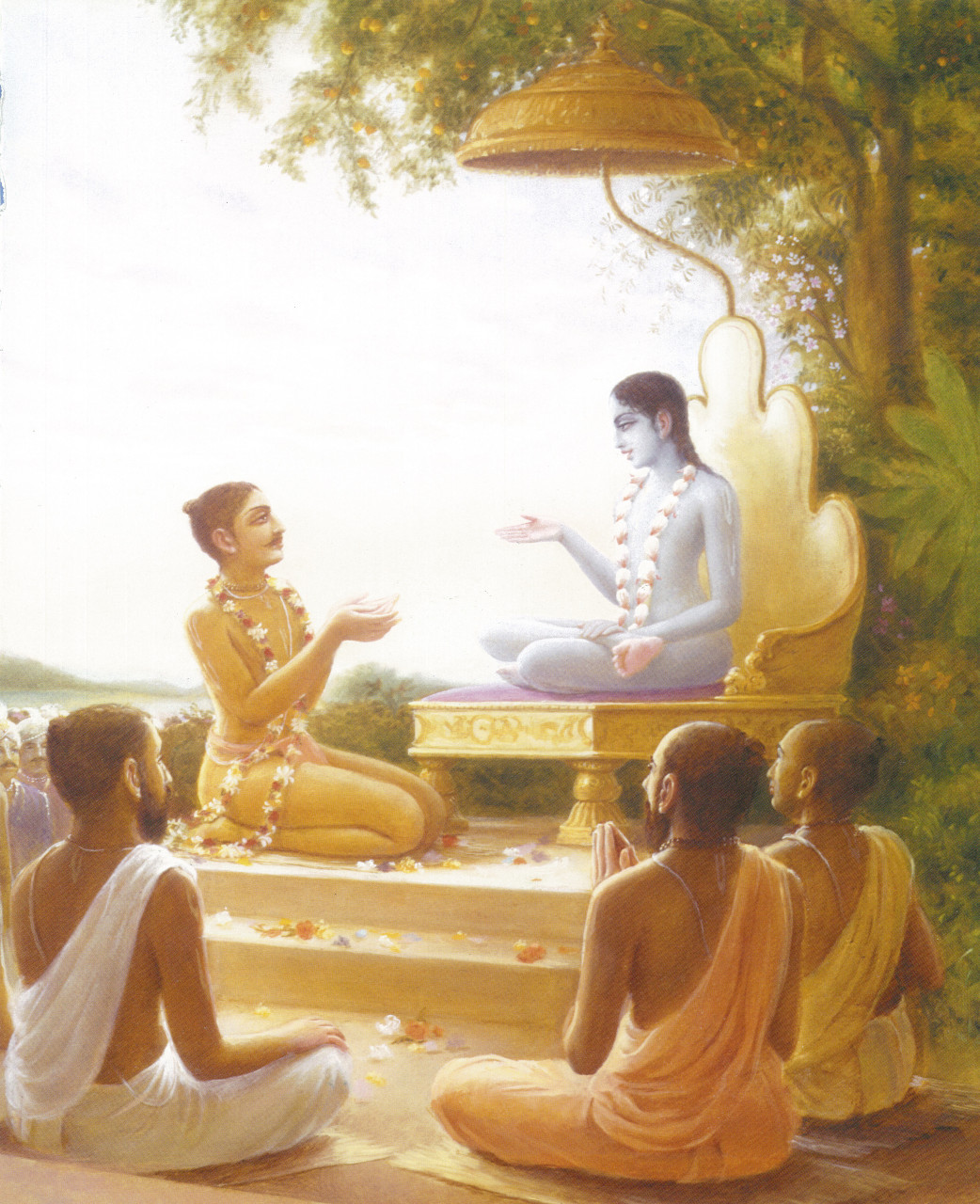 regularly. Sometimes they are restless and upset, and thus they give up worshipping Ṭhākurajī (the deity), chanting, remembering and reading books. I have come to remind you to not be like that; do not be weak. Your suffering will increase by whatever you are doing to decrease it. So don’t be upset, but rather try to chant more and read more. When reading the books of parāma-pūjyapāda Śrīla Bhaktivedānta Svāmī Mahārāja, you should think, “He is instructing me.” If reading a book of Śrīla Rūpa Gosvāmī, think that Śrīla Rūpa Gosvāmī is speaking to you; and if reading Śrīmad-Bhāgavatam, think that Śrīla Śukadeva Gosvāmī and Śrīla Vyāsadeva are speaking to you. And always pray to Lord Kṛṣṇa and Śrī Gurudeva to sprinkle their mercy upon you.
regularly. Sometimes they are restless and upset, and thus they give up worshipping Ṭhākurajī (the deity), chanting, remembering and reading books. I have come to remind you to not be like that; do not be weak. Your suffering will increase by whatever you are doing to decrease it. So don’t be upset, but rather try to chant more and read more. When reading the books of parāma-pūjyapāda Śrīla Bhaktivedānta Svāmī Mahārāja, you should think, “He is instructing me.” If reading a book of Śrīla Rūpa Gosvāmī, think that Śrīla Rūpa Gosvāmī is speaking to you; and if reading Śrīmad-Bhāgavatam, think that Śrīla Śukadeva Gosvāmī and Śrīla Vyāsadeva are speaking to you. And always pray to Lord Kṛṣṇa and Śrī Gurudeva to sprinkle their mercy upon you.
Then: dvitīya–yāma sādhana – practising the limbs of bhakti in the association of pure sādhus and gradually coming to anartha-nivṛtti (gradual removal of anarthas). Only sādhu-saṅga can remove all your offences and unwanted things. No one else can remove them. Always give importance to your chanting – more than to making money – then all your problems will be solved. Have a very strong belief that the holy name is Śrī Kṛṣṇa and Śrīmatī Rādhikā Themselves. To give us this strong belief Śrīla Bhaktivinoda Ṭhakūra quotes the verse:
nāmnām akāri bahudhā nija-sarva-śaktis
tatrārpitā niyamitaḥ smaraṇe na kālaḥ
etādṛśī tava kṛpā bhagavan mamāpi
durdaivam īdṛśam ihājani nānurāgaḥ
(Śrī Śikṣāṣṭakam, Verse 2)
[“O Bhagavān! Your holy name bestows all auspiciousness upon the living entities. Therefore, for the benefit of the jīvas, You eternally manifest Your innumerable names, such as Rāma, Nārāyaṇa, Kṛṣṇa, Mukunda, Mādhava, Govinda, and Dāmodara. You have invested those names with all the potencies of their respective forms. Out of causeless mercy, You have not even imposed any restrictions on the chanting and remembrance of such names. Nonetheless, I am so unfortunate due to committing offences that I have no attachment for Your holy name, which is so easily accessible and bestows all good fortune.”]
What is sādhu-saṅga? Sat is Kṛṣṇa: sac-cid-ānanda-ghana (the condensed form of eternity, bliss and knowledge). He is the only Sat (Supreme existence), and only those who are serving Sat are sādhus. Especially, those who are following the gopīs and Śrīmatī Rādhikā are the most qualified sādhus.
Kṛṣṇa has placed all His power, mercy, beauty, and so on in His names. The sixteen names in the Hare Kṛṣṇa mantra are very powerful, even more so than Bhagavān Śrī Kṛṣṇa Himself. The names are not simple names; they are śabda-brahma (the Absolute Truth in the form of sound, or the transcendental sound of the complete body of Vedic knowledge), Śrī Kṛṣṇa Himself. He has made no rules and regulations, such as, “You cannot chant in the morning”, or “You can chant only after bathing”, or “You can only chant at midnight”, or “You cannot chant while walking.” There are no rules and regulations.
On one hand we have so much causeless mercy from Lord Kṛṣṇa, and on the other hand we have no respect and no belief that His name can give us money. We depend on our jobs and money-making activities, and not on His name. We can see our ideals in our guru-paramparā. What was Śrīla Haridāsa Ṭhakūra doing for maintenance? What were Śrīla Rūpa Gosvāmī, Śrīla Raghunātha dāsa Gosvāmī, Śrīla Bhaktivedānta Svāmī Mahārāja and myself doing? Nothing, and yet we are maintained better than all of you. I am not maintaining my life; you are – by the inspiration of Śrī Kṛṣṇa. Have a strong belief in this.
There are six limbs of śaraṇāgati, surrender to Śrī Kṛṣṇa:
ānukūlyasya saṅkalpaḥ
prātikūlyasya varjanam
rakṣiṣyatīti viśvāso
goptṛtve varaṇaṁ tathā
ātma-nikṣepa-kārpaṇye
ṣaḍ-vidhā śaraṇāgatiḥ
(Hari-bhakti-vilāsa 11.676)
[There are six symptoms of self-surrender (śaraṇāgati). The first two are ānukūlyasya saṅkalpa and prātikūlyasya varjanam: “I will only do that which is favourable for unalloyed bhakti, and I will reject all that is unfavourable.” This is called saṅkalpa or pratijñā, a solemn vow. The third symptom is rakṣiṣyatīti viśvāso, faith in Bhagavān as one’s protector: “Bhagavān is my only protector. I can derive absolutely no benefit from jñāna, yoga, and other such practices.” This is an expression of trust (viśvāsa). The fourth symptom is goptṛtve varaṇaṁ, deliberate acceptance of Bhagavān as one’s maintainer: “I cannot obtain anything, or even maintain myself, by my endeavour. I will serve Bhagavān as far as I am able, and He will take care of me.” This is what is meant by dependence (nirabharatā). The fifth symptom is ātma-nikṣepa, the absence of independent mood. “Who am I? I am His. My duty is to fulfil His desire.” This is submission of the self (ātma-nivedana). The sixth symptom is kārpaṇye, meekness: “I am wretched, insignificant, and materially destitute.” This is what is meant by humility (kārpanya or dainya).]
Very strongly accept what is favourable for bhakti and strongly reject what is unfavourable. Kṛṣṇa Bhagavān has 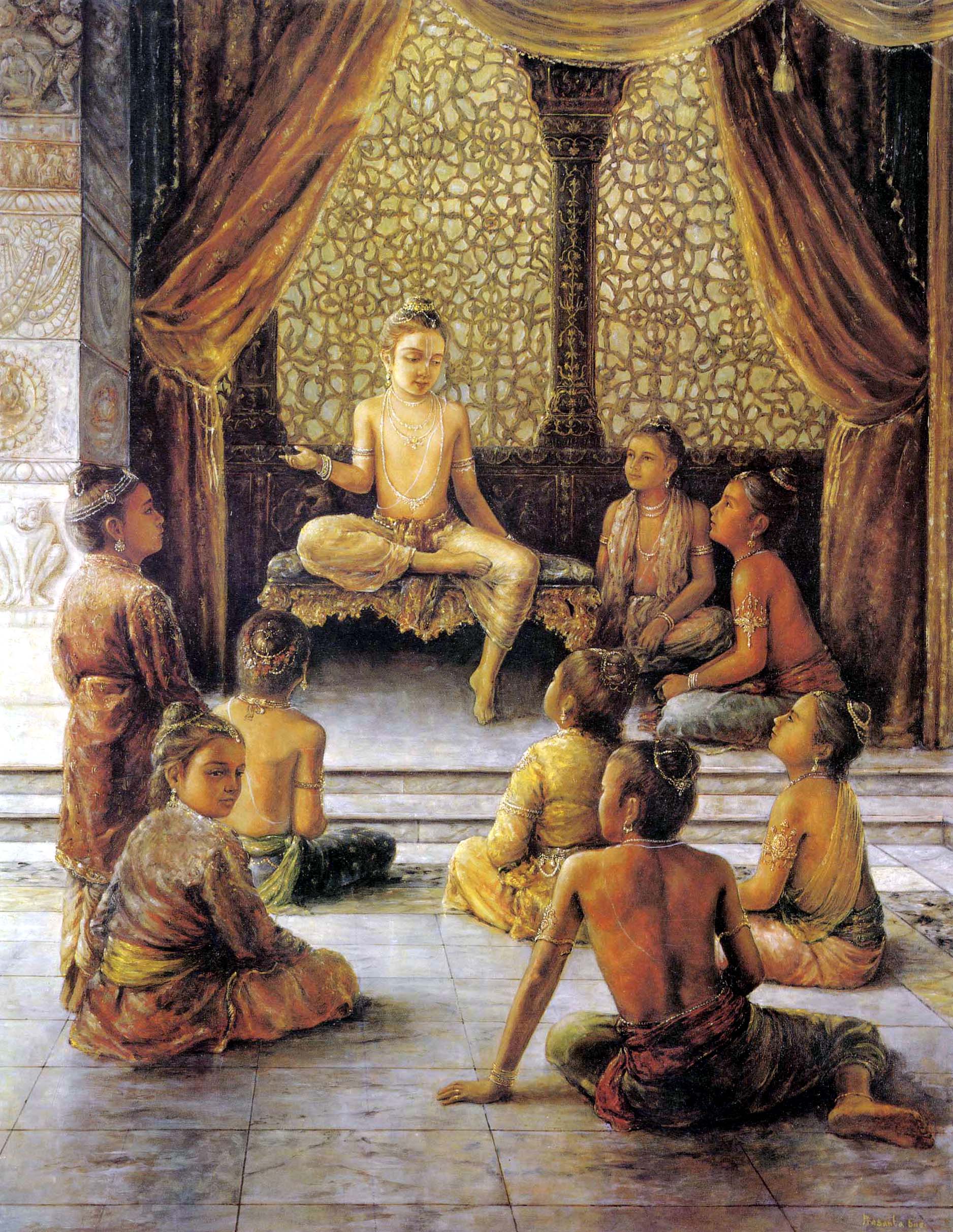 created all these worlds and He is powerful enough to save anyone and to do anything. If you have taken His shelter and are surrendered, then give up everything “on the head of Śrī Kṛṣṇa” and don’t be worried. If He can create millions of universes and He is supporting even a fish in the sea and a bird amid mountains where there is no one to maintain them, why won’t He support you? Be like Śrī Prahlāda Mahārāja. Have belief that Lord Kṛṣṇa will support you, and you will see that He is true to the words He has spoken in the Bhagavad-gītā, “For those who are ananya-bhaktas, those who don’t know anyone other than Me, I take the responsibility for all the paraphernalia of their lives on My head and shoulders. I carry that paraphernalia Myself, and I support and nourish those devotees.” He will surely keep His promise, but we have no strong faith in this and that is why we suffer. You will suffer if you are not surrendered.
created all these worlds and He is powerful enough to save anyone and to do anything. If you have taken His shelter and are surrendered, then give up everything “on the head of Śrī Kṛṣṇa” and don’t be worried. If He can create millions of universes and He is supporting even a fish in the sea and a bird amid mountains where there is no one to maintain them, why won’t He support you? Be like Śrī Prahlāda Mahārāja. Have belief that Lord Kṛṣṇa will support you, and you will see that He is true to the words He has spoken in the Bhagavad-gītā, “For those who are ananya-bhaktas, those who don’t know anyone other than Me, I take the responsibility for all the paraphernalia of their lives on My head and shoulders. I carry that paraphernalia Myself, and I support and nourish those devotees.” He will surely keep His promise, but we have no strong faith in this and that is why we suffer. You will suffer if you are not surrendered.
Don’t be upset. Be like Śrīla Haridāsa Ṭhakūra who was beaten in so many marketplaces and at the same time was always chanting, “Hare Kṛṣṇa, Hare Kṛṣṇa” and feeling no pain. Śrī Prahlāda Mahārāja was given poison and thrown in a fire, but nothing happened to him. This is śraddhā.
Śrīla Haridāsa Ṭhakūra told his executioners, “Even if you cut me in pieces, I cannot give up chanting the holy name.” Be like this and you will see that Lord Kṛṣṇa is always with you.
māyā-mugdhasya jīvasya
jñeyo ’narthaś catur-vidhaḥ
hṛd-daurbalyaṁ cāparādho
’sat-tṛṣṇā tattva-vibhramaḥ
(Śrī Bhajana-rahasya 2.7)
[“The anarthas of the living entities enchanted by the illusory energy are of four kinds: (1) illusion about one’s real identity (svarūpa-bhrama), (2) hankering for what is temporary (asat-tṛṣṇā), (3) offences (aparādha) and (4) weakness of heart (hṛdaya-daurbalya). They bind the living entity to the material world and entangle him in its miseries.]
All conditioned souls are full of anarthas, and the first is svarūpa-bhrama. We have deviated from our transcendental constitutional form and have forgotten Kṛṣṇa. Therefore so many worldly desires come, and while fulfilling all these desires our heart becomes weak and then aparādhas come and we are thus bound up. At that time we want to go very far away from Kṛṣṇa and guru.
[Śrīla Bhaktivedānta Nārāyaṇa Mahārāja then called on various devotees who spoke at length about the four types of anarthas. For the sake of brevity we are substituting their speeches with the description given in Śrī Bhakti-rasāmṛta-sindhu-bindu by Śrīla Viśvanātha Cakravartī Ṭhākura:]
“ Anarthas are of four kinds: (1) svarūpa-bhrama (illusion about spiritual identity), (2) asat-tṛṣṇā (thirst for that which is unreal; that is, material enjoyment), (3) aparādha (offences) and (4) hṛdaya-daurbalya (weakness of heart).
“ Svarūpa-bhrama is of four kinds: (1) sva-tattva- or jīva-svarūpa-bhrama (illusion about one’s own spiritual identity), (2) paratattva-bhrama (illusion about the spiritual identity of the supreme absolute truth), (3) sādhya-sādhana-tattva-bhrama (illusion about sādhana-bhakti, the means of spiritual perfection, and sādhya, the object to be obtained by such sādhana, or in other words prema-bhakti) and (4) māyā-tattva-bhrama (illusion about the Lord’s external energy, māyā).
“ Asat-tṛṣṇā is of four types: (1) varieties of desires for material enjoyment in this world, (2) desires for enjoyment in the higher planetary systems of Svargaloka, (3) desires for the attainment of the eight mystic siddhis and the nine divine jewels of Kuvera (padma, mahāpadma, śaṅkha, makara, kacchapa, mukunda, kunda, nīla and kharva) and (4) the desire for mukti.
“ Aparādha is of four kinds: (1) offences towards Śrī Kṛṣṇa, (2) offences towards kṛṣṇa-nāma, (3) offences towards kṛṣna-svarūpa (the deity form of the Lord) and (4) offences towards the tadīya-cit-kaṇa-jīvas (living entities who are infinitesimal particles of spirit belonging to the Lord).
“ Hṛdaya-daurbalya is of four kinds: (1) tuccha-āsakti (attachment for useless things), (2) kūṭī-nāṭī (deceitful behaviour – the word kūṭī-nāṭī may be broken down into the constituent parts kū, bad or evil, and na or nāṭī, that which is forbidden. In that case it would mean doing wicked deeds or doing that which is forbidden), (3) mātsarya (envy) and (4) sva-pratiṣṭhā-lālasā (desire for one’s fame and prestige).”
Śrīla Bhaktivedānta Nārāyaṇa Mahārāja: If you have the four kinds of anarthas, you cannot chant pure  harināma or even nāmābhāsa. After some time you will be so weak that you will give up chanting and remembering Bhagavān Śrī Kṛṣṇa and your Guru, and you will throw your deities into the ocean. Now you are worshipping so many deities, but at that time you will worship none. Try to be careful of nāma-aparādha, sevā-aparādha and tadīya-aparādha (tadīya means those personas and places associated with Kṛṣṇa like Gaṅgā, Yamunā, dhāma and all the Vaiṣṇavas). If you don’t criticize any Vaiṣṇava, very soon you will be able to achieve the pure holy name.
harināma or even nāmābhāsa. After some time you will be so weak that you will give up chanting and remembering Bhagavān Śrī Kṛṣṇa and your Guru, and you will throw your deities into the ocean. Now you are worshipping so many deities, but at that time you will worship none. Try to be careful of nāma-aparādha, sevā-aparādha and tadīya-aparādha (tadīya means those personas and places associated with Kṛṣṇa like Gaṅgā, Yamunā, dhāma and all the Vaiṣṇavas). If you don’t criticize any Vaiṣṇava, very soon you will be able to achieve the pure holy name.
We should try to understand the Śrī Upadeśāmṛta, especially the first eight verses. These are very important.
vāco vegaṁ manasaḥ krodha-vegaṁ
jihvā-vegam udaropastha-vegam
etān vegān yo viṣaheta dhīraḥ
sarvām apīmāṁ pṛthivīṁ sa śiṣyāt
(Śrī Upadeśāmṛta, Verse 1)
[“A sober person who can tolerate the urge to speak, the mind’s demands, the actions of anger and the urges of the tongue, belly and genitals is qualified to make disciples all over the world.”]
atyāhāraḥ prayāsaś ca
prajalpo niyamāgrahaḥ
jana-saṅgaś ca laulyaṁ ca
ṣaḍbhir bhaktir vinaśyati
(Śrī Upadeśāmṛta, Verse 2)
[“One’s devotional service is spoiled when he becomes too entangled in the following six activities: (1) eating more than necessary or collecting more funds than required; (2) over-endeavouring for mundane things that are very difficult to obtain; (3) talking unnecessarily about mundane subject matters; (4) practising the scriptural rules and regulations only for the sake of following them and not for the sake of spiritual advancement, or rejecting the rules and regulations of the scriptures and working independently or whimsically; (5) associating with worldly-minded persons who are not interested in Kṛṣṇa consciousness; and (6) being greedy for mundane achievements.”]
utsāhān niścayād dhairyāt
tat-tat-karma-pravartanāt
saṅga-tyāgāt sato vṛtteḥ
ṣaḍbhir bhaktiḥ prasidhyati
(Śrī Upadeśāmṛta, Verse 3)
[“There are six principles favourable to the execution of pure devotional service: (1) being enthusiastic, (2) endeavouring with confidence, (3) being patient, (4) acting according to regulative principles [such as śravaṇaṁ kīrtanaṁ viṣṇoḥ smaraṇam – hearing, chanting and remembering Kṛṣṇa], (5) abandoning the association of non-devotees, and (6) following in the footsteps of the previous ācāryas. These six principles undoubtedly assure the complete success of pure devotional service.”]
This verse is very important. You should come in that process which is favourable for bhakti. Utsāha means enthusiasm. Do not be lazy in chanting, remembering, and all the other limbs of bhakti. Be very enthusiastic, more so than in your worldly jobs or duties. You should have strong faith in Lord Kṛṣṇa’s words and the words of the scriptures and your Gurudeva. If any problems come, keep your feet on the head of all the problems; never be weak.
Try to give up all kinds of sense gratification and reject all things not favourable for bhakti. Avoid the association of non-devotees and the association of strī-saṅgī (the opposite sex) and those absorbed in association with the opposite sex. Also avoid the association of Māyāvādīs, sahajiyās and others like them. Be very careful to avoid them. Sato vṛtte – our guru-varga (disciplic succession) has made some rules and regulations regarding those in the renounced order. A sannyāsī should not do any business, for it will spoil his bhajana. He should not make an incense factory or anything of that sort. A gṛhastha can do that, not with full energy but only to maintain his life, or else it will ruin his bhajana as well.
We should remember that there are two things, maintenance of life and practice of bhakti, and both are needed. If you cannot maintain your life you will die, and then who will practice bhakti-yoga? Maintain, but do not be attached. Have a strong belief in Śrī Kṛṣṇa.
Sannyāsīs like Śrīla Rūpa Gosvāmī and Śrīla Sanātana Gosvāmī sometimes went to householders and begged  simple prasāda like capātīs, and this kind of begging is called mādhukarī. Regarding householder devotees, Śrīvasa Ṭhakūra, Śrī Puṇḍarīka Vidyānidhi and others like them led very simple lives. The first line of this verse, utsāhān niścayād dhairyāt, explains how to practice bhakti-yoga, and the second line, tat-tat-karma-pravartanāt, tells how to maintain our life. The maintenance of our life should be pure. We should not make money by drug selling and similar occupations.
simple prasāda like capātīs, and this kind of begging is called mādhukarī. Regarding householder devotees, Śrīvasa Ṭhakūra, Śrī Puṇḍarīka Vidyānidhi and others like them led very simple lives. The first line of this verse, utsāhān niścayād dhairyāt, explains how to practice bhakti-yoga, and the second line, tat-tat-karma-pravartanāt, tells how to maintain our life. The maintenance of our life should be pure. We should not make money by drug selling and similar occupations.
dadāti pratigṛhṇāti
guhyam ākhyāti pṛcchati
bhuṅkte bhojayate caiva
ṣaḍ-vidhaṁ prīti-lakṣaṇam
(Śrī Upadeśāmṛta, Verse 4)
[“Offering gifts in charity, accepting charitable gifts, revealing one’s mind in confidence, inquiring confidentially, accepting prasāda and offering prasāda are the six symptoms of love shared by one devotee and another.”]
dṛṣṭaiḥ svabhāva-janitair vapuṣaś ca doṣair
na prākṛtatvam iha bhakta-janasya paśyet
gaṅgāmbhasāṁ na khalu budbuda-phena-paṅkair
brahma-dravatvam apagacchati nīra-dharmaiḥ
(Śrī Upadeśāmṛta, Verse 6)
[“Being situated in his original Kṛṣṇa conscious position, a pure devotee does not identify with the body. Such a devotee should not be seen from a materialistic point of view. Indeed, one should overlook a devotee’s having a body born in a low family, a body with a bad complexion, a deformed body, or a diseased or infirm body. According to ordinary vision, such imperfections may seem prominent in the body of a pure devotee, but despite such seeming defects, the body of a pure devotee cannot be polluted. It is exactly like the waters of the Ganges, which sometimes during the rainy season are full of bubbles, foam and mud. The Ganges waters do not become polluted. Those who are advanced in spiritual understanding will bathe in the Ganges without considering the condition of the water.”]
Try to give up your dehātma-buddhi. Don’t think “I am this body,” and don’t think that the body of a pure Vaiṣṇava is mortal. He may be black, he may have crooked teeth and sometimes he may appear to speak harshly, but don’t be cheated by those symptoms. Sometimes he may chastise you, but that is for your welfare. He may look ugly, but his soul is very beautiful, so don’t criticize or offend him.
All rivers, ponds, etc. have some mud and foam. The Ganges does too, but her water is never contaminated  even today. All rivers are contaminated, but this water is so pure that if you keep it in a bottle for months at a time it will not get polluted by worms or germs. The Ganges is the caraṇāmṛta (water that bathed the feet) of Śrī Vāmanadeva, and she is also the most beloved Ganges who is serving Śrī Kṛṣṇa in Goloka Vṛndāvana. Once, Gaṅgā-sakhī was meeting with Kṛṣṇa, and in the meantime Śrīmatī Rādhikā came. Both Śrī Kṛṣṇa and the Śrīmatī Gaṅgā-sakhī became upset and thought, “What to do? Śrīmatī Rādhikā has come.” So Gaṅgā-sakhī became a river and Kṛṣṇa became śālagrāma-śilā (worshipable stone), and thus they avoided being seen and Śrīmatī Rādhikā did not become sulky (in transcendental loving jealous anger). The Ganges is that sakhī, the beloved of Kṛṣṇa. She will never be contaminated though there appears to be so much foam, clay and mud. Similarly, a pure Vaiṣṇava may look ugly to you, but his soul is very beautiful. If he speaks harshly, no harm; because he is actually very compassionate.
even today. All rivers are contaminated, but this water is so pure that if you keep it in a bottle for months at a time it will not get polluted by worms or germs. The Ganges is the caraṇāmṛta (water that bathed the feet) of Śrī Vāmanadeva, and she is also the most beloved Ganges who is serving Śrī Kṛṣṇa in Goloka Vṛndāvana. Once, Gaṅgā-sakhī was meeting with Kṛṣṇa, and in the meantime Śrīmatī Rādhikā came. Both Śrī Kṛṣṇa and the Śrīmatī Gaṅgā-sakhī became upset and thought, “What to do? Śrīmatī Rādhikā has come.” So Gaṅgā-sakhī became a river and Kṛṣṇa became śālagrāma-śilā (worshipable stone), and thus they avoided being seen and Śrīmatī Rādhikā did not become sulky (in transcendental loving jealous anger). The Ganges is that sakhī, the beloved of Kṛṣṇa. She will never be contaminated though there appears to be so much foam, clay and mud. Similarly, a pure Vaiṣṇava may look ugly to you, but his soul is very beautiful. If he speaks harshly, no harm; because he is actually very compassionate.
We have experience of this with pūjyapāda Trivikrāma Mahārāja. Once his father and mother came to visit him, and at that time he spoke many harsh words to his father. I became upset and later asked him. “Why were you speaking like that to your father? You are indebted to your mother and father.” He said, “I know, but I spoke like that because I do not want them to be attached to me and make any problem for my living in the maṭha. That is why I outwardly spoke like that.” Śrīla Trivikrāma Mahārāja used to chastise the brahmacārīs if they had done wrong; so everyone used to fear him. In his last days, however, he manifested a very humble nature and was like a small child. So don’t criticize, otherwise you will lose your bhakti.
kṛṣṇeti yasya giri taṁ manasādriyeta
dīkṣāsti cet praṇatibhiś ca bhajantam īśam
śuśrūṣayā bhajana-vijñam ananyam anya-
nindādi-śūnya-hṛdam īpsita-saṅga-labdhyā
(Śrī Upadeśāmṛta, Verse 5)
[“One should mentally honour the devotee who chants the holy name of Lord Kṛṣṇa, one should offer humble obeisances to the devotee who has undergone spiritual initiation [dīkṣā] and is engaged in worshipping the Deity, and one should associate with and faithfully serve that pure devotee who is advanced in undeviated devotional service and whose heart is completely devoid of the propensity to criticize others.”]
It is stated here that there are three kinds of Vaiṣṇavas, and we should respect them properly according to their stage.
First you should come from the stage of kaniṣṭha-adhikārī to the stage of madhyama-adhikārī. Then, in madhyama-adhikārī, you will be able to do this. You will be able to recognize who is a pure Vaiṣṇava and who is not a Vaiṣṇava. If you cannot realize this it means you are still a kaniṣṭha. If you are in the stage of kaniṣṭha-adhikārī there is nothing to tell you. Gradually, by sādhu-saṅga, you will know all these things. A kaniṣṭha-adhikārī is ignorant, and some ignorance can be tolerated.
However, a madhyama-adhikārī should be very careful. He should know the proper etiquette in serving and glorifying Vaiṣṇavas. If someone has not taken dīkṣā, who is not initiated and is not a pure Vaiṣṇava but time to time chants Hare Kṛṣṇa or Kṛṣṇa-Rādhe, a madhyama-adhikārī should honour him by mind but not by body and offering praṇāma. If one is kaniṣṭha he should be asat-saṅga tyāgī. He should not mix with Māyāvādīs, sense enjoyers, lusty persons or the opposite sex. If he is chanting the holy name, whether he is initiated or not, properly honour him by your mind. You can think, “He is svajātīya (like-minded); he is like our brother, but ignorant.” When dīkṣā initiation has been given and the devotee has a relationship with Śrī Kṛṣṇa, and makes his offerings to Him with that relationship and chants and remembers Him in that special relationship, then you should honour him by your words, body and mind. He is chanting nāmābhāsa, and after some time his chanting will change to pure nāma.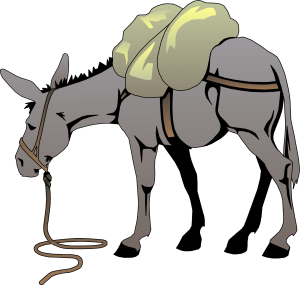
Do not give respect to anyone and everyone, just because they wear tulasī-mālā and big tilaka. If someone puts tilaka and big japa-mālā on a donkey, will you do praṇāma to that donkey? No. Similarly, someone may be like an animal internally, but externally puts on long tilaka and carries four-kilo chanting beads. That does not make him a pure Vaiṣṇava. Try to realize this. Don’t give respect or offer praṇāma to such a person – even if he is chanting.
Then, “bhajantam īśam.” If a devotee is always chanting the holy name with relation, you should honour him by śuśrūṣayā (practical service).
tad viddhi praṇipātena
paripraśnena sevayā
upadekṣyanti te jñānaṁ
jñāninas tattva-darśinaḥ
(Bhagavad-gītā 4.34)
[“Just try to learn the truth by approaching a spiritual master. Inquire from him submissively and render service unto him. The self-realized souls can impart knowledge unto you because they have seen the truth.”]
You should do viśrambheṇa-sevā (intimate service) to that bona fide guru. He never criticizes anyone good or bad. He is always sinking in the ocean of services to Śrī Śrī Rādhā-Kṛṣṇa. Bhajana-vijñam ananyam anya. He is always sinking in the ocean of love and affection for Kṛṣṇa. By seeing such devotees, Śrī Kṛṣṇa’s name comes to you: Hare Kṛṣṇa Hare Kṛṣṇa.
In this way, those who are sometimes chanting are kaniṣṭha Vaiṣṇavas; those who are remembering continuously are madhyama-adhikārī; and those who by seeing kṛṣṇa-nāma is inspired in our heart, they are uttama-adhikārī. Giving up everything and, putting your whole heart at the lotus feet of the uttama-adhikārīs and serving them, you can quickly attain bhakti.
Suppose you are chanting the holy name, hearing hari-kathā, remembering Kṛṣṇa Bhagavān and doing arcana, but you have no taste for those devotional activities. If this is the case, you may be very weak. Don’t follow your uncontrolled mind; follow your Guru’s words. Even if you have no taste, continue to chant regularly. This is the medicine and the diet for that disease of lack of devotion. Suppose you have been doing these activities for some time but have no taste in hearing, but you attend the Vaiṣṇavas’ classes and sit in the front line to hear. You may become sleepy, so take some water to keep yourself awake. In India we have a plant which, if you touch its leaves, you will itch everywhere. Also, put some chilli powder near your eyes and then you will weep. Doing so and continuously hearing, gradually a taste will come as you continuously chant, whether your mind wants to or not.
There was a pure Vaiṣṇava named pūjyapāda Narahari Prabhu, a prominent disciple of Śrīla Bhaktisiddhānta Sarasvatī Ṭhakūra, and I saw that he used to chant throughout the day and night. He used to chant while doing service or going anywhere. He slept very little during the night and while chanting at that time he used to tie his śikhā to a high object by a rope and he remained standing. Be sincere and try to follow this principle. Then, if you have no taste, taste will come.
Then:
tan-nāma-rūpa-caritādi-sukīrtanānu-
smṛtyoḥ krameṇa rasanā-manasī niyojya
tiṣṭhan vraje tad-anurāgi-janānugāmī
kālaṁ nayed akhilam ity upadeśa-sāram
(Śrī Upadeśāmṛta, Verse 8)
[“The essence of all advice is that one should utilize one’s full time-twenty-four hours a day – in nicely chanting and remembering the Lord’s divine name, transcendental form, qualities and eternal pastimes, thereby gradually engaging one’s tongue and mind. In this way one should reside in Vraja [Goloka Vṛndāvana-dhāma] and serve Kṛṣṇa under the guidance of devotees. One should follow in the footsteps of the Lord’s beloved devotees, who are deeply attached to His devotional service.”]
Now come with me to Vṛndāvana, to Sevā-kuñja, where Śrī Kṛṣṇa is very busy pacifying Śrīmatī Rādhikā, placing His flute at Her lotus feet. Śrīla Rūpa Gosvāmī is there, and at the same time he is giving instructions to us. He is telling us the essence of all instructions in one śloka, as one would place the entire ocean in a pitcher.
Tan nāma. The name of Śrī Kṛṣṇa is very powerful but between the name Kṛṣṇa and the name Dāmodara, which is superior? All names are okay, but Dāmodara is somewhat more powerful. While chanting the name Dāmodara, you should remember His pastimes. Remember how Mother Yaśodā bound Him with ropes even though He is the Supreme Lord. There is no one more powerful than He, but He forgets that “I am the Supreme Lord and I have so much power. Ṣaḍ-aiśvarya – I am full with six opulences.” Seeing Mother Yaśodā He wept, and at last He was tied to the mortar. Remember this.
he kṛṣṇa karuṇā-sindho
dīna-bandho jagat-pate
gopeśa gopikā-kānta
rādhā-kānta namo ’stu te
[Śrī Kṛṣṇa, You are an ocean of mercy, the friend of the fallen, Lord of the universe, master of the cowherds, beloved of the gopīs, and [above all] the beloved of Śrī Rādhā. I offer praṇāma unto You.]
Gopī-kānta means most beloved of all the gopīs. You should chant this name and remember His sweet pastimes with the gopīs as He played His flute. The essence of all the Vedas and Upaniṣads is klīṁ; by that essence Śrī Kṛṣṇa was calling the gopīs, and each gopī thought, “Kṛṣṇa is only calling me.”
Some of the gopīs had been cooking, but they left that. Some of them had been boiling rice, and they left it 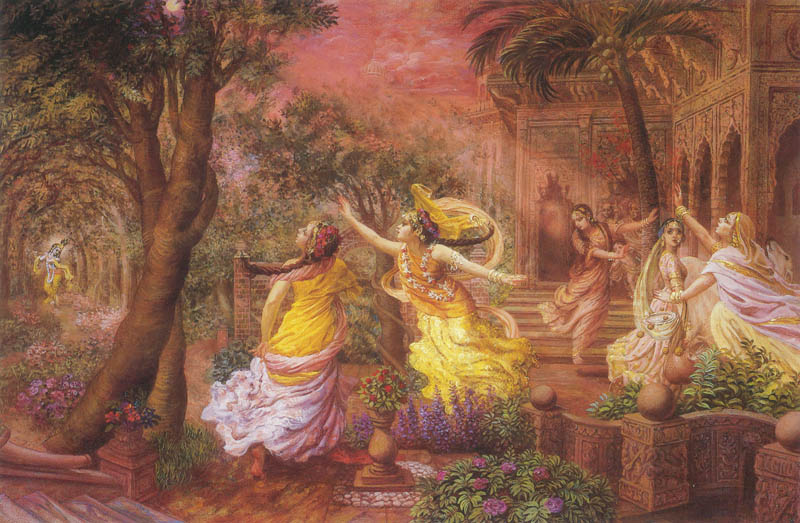 boiling. Some of them had been making capātīs, and they left them on the fire with no concern if they burned or not. They didn’t look behind. Those who were nourishing their husbands, distributing prasādam and serving their children left all those activities. Some had been decorating themselves and had finished putting kājala on one eye, but they had no time to put it on the other. Some had been putting on ornaments, and upon hearing Śrī Kṛṣṇa’s flute they put their necklaces on their waists and other ornaments somewhere else. They forgot everything and ran to Him.
boiling. Some of them had been making capātīs, and they left them on the fire with no concern if they burned or not. They didn’t look behind. Those who were nourishing their husbands, distributing prasādam and serving their children left all those activities. Some had been decorating themselves and had finished putting kājala on one eye, but they had no time to put it on the other. Some had been putting on ornaments, and upon hearing Śrī Kṛṣṇa’s flute they put their necklaces on their waists and other ornaments somewhere else. They forgot everything and ran to Him.
When they arrived, however, He told them, “Oh, I am very happy you came to see Me, because I am Parambrahma, the creator of the entire world. Now you have taken darśana, so now you should return to your homes.” The gopīs were silent. Looking down at the earth, they scratched it with their nails. With tears falling from their eyes they asked each other, “Why is He being so tricky? What is He telling us?” Śrī Kṛṣṇa then said, “Even if your husband is ugly or blind, even if he is not earning money, you should try to serve him. Now the forest is full of wild beasts and the night is dark, so you should return home.”
Many gopīs were present there, and they gave a variety of arguments to Kṛṣṇa.
One gopī said, “We cannot return yet You should first return our hearts, which you have stolen. Our hearts are the biggest wealth of our lives. You should return them; and if you don’t, we cannot go. What will we do if you don’t return our hearts? Without our hearts, how can we walk and what would we do once we reach home?”
Śrī Kṛṣṇa said, “Still, you will have to go and serve your husbands.”
The gopīs said, “You are a very high class of Guru, and if You are God Himself, then You have written in the Bhagavad-gītā or somewhere else that, “First surrender and worship and serve your Guru, then Me.” So we are doing that exact thing. You are our Guru, because You are giving us so much knowledge by telling us, “You should serve your husbands.” So if you do not give us a chance to serve You, then you have deviated from the principle of Guru. We thus reject You as Guru and we will not follow You.
“And one thing more. Our husbands are not our husbands. The meaning of ‘pati‘ is as follows: pa indicates pālana – to nourish and support; and ti indicates ‘tra‘ – to deliver from miseries. Our husbands cannot do this. They themselves are greatly suffering, so they cannot help us. If we were about to die, what could they do? You can do something, so You are really our husband and most beloved. If we have done something wrong, then You are to blame – because You have a very handsome, attractive and sweet appearance. Even demigods and their wives are attracted by You. Even Lakṣmī, the wife of Nārāyaṇa, forgot her husband and came to You. If anything is wrong, it is that You are very beautiful and You have played on Your flute. Why did You play on Your flute and call us? Oh, You will have to accept us.”
In this way they defeated Śrī Kṛṣṇa, and that Śrī Kṛṣṇa is Gopī-kānta. Remember these kinds of pastimes and at the same time chant:
hare kṛṣṇa hare kṛṣṇa, kṛṣṇa kṛṣṇa hare hare
hare rāma hare rāma, rāma rāma hare hare
If you are chanting “Rādhā-Rāsa-vihārī”, remember the sweet pastimes of rasa. If “Rādhā-kānta” then remember the sweet pastimes of Śrī Kṛṣṇa as the beloved of Śrīmatī Rādhārāṇī. Once, Śrī Kṛṣṇa was going cow-herding with His millions upon millions of cow-herd friends. Śrī Baladeva Prabhu with his plough was in the front, Kṛṣṇa was in the middle, and all the sakhās were surrounding them. His face was very beautiful and His footprints were beautifying the earth.
The cowherd boys were glorifying Śrī Kṛṣṇa with the words “Sādhu sādhu (Excellent, excellent)!” Then Śrī Kṛṣṇa 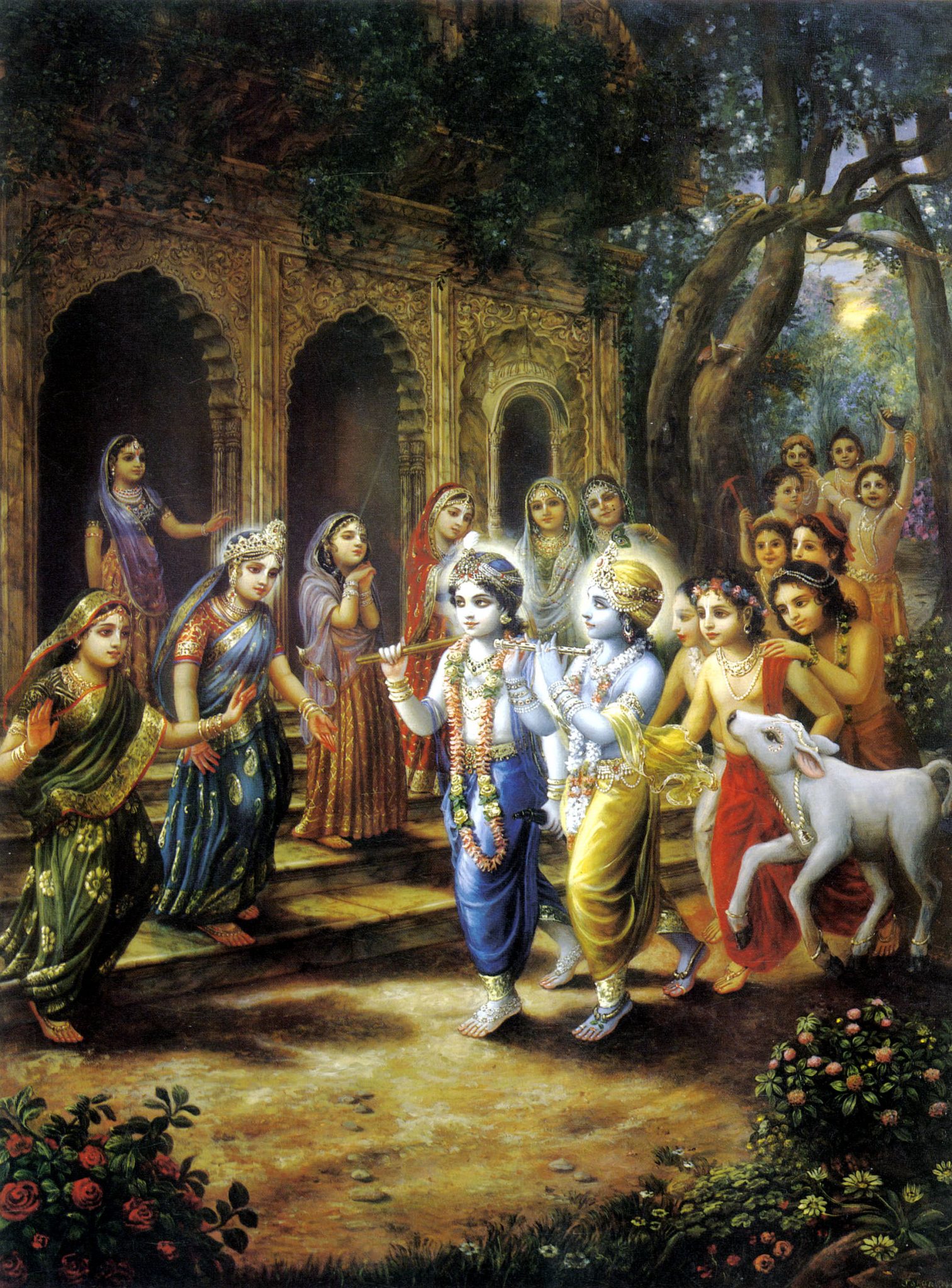 saw a very attractive young lady and thought “I am very beautiful, but this girl is more beautiful. I am sweet, but She is more sweet. I have all kinds of good qualities, but She is more qualified. When I see Her, My eyes and heart feel successful. Who is She?”
saw a very attractive young lady and thought “I am very beautiful, but this girl is more beautiful. I am sweet, but She is more sweet. I have all kinds of good qualities, but She is more qualified. When I see Her, My eyes and heart feel successful. Who is She?”
She was Śrīmatī Rādhikā, and when She looked towards Kṛṣṇa His flute fell from His hand and His peacock feather slid down from His head.
Śrī Kṛṣṇa became faint and was about to fall; but in the meantime Madhumaṅgala told Him, “What are You doing? Don’t You see that Your mother and father are here?”
Remember these sweet pastimes and chant “Rāsa-vihārī, Rādhā-rāmana ki jaya!”
nārada muni, bājāya vīṇā, ‘rādhikā-ramaṇa’ name
nāma amani, udita hoya, bhakata-gīta-sāme
[The great sage Nārada plays his vīṇā in accompaniment to [the chanting of] the names of Śrī Rādhikā-Ramaṇa, and the holy name immediately appears amidst the devotees’ singing.]
Gītāvalī, Nārada Muni (1) by Śrīla Bhaktvinoda Ṭhākura
The holy name is the essence of nectar. Śrī Nārada Muni was chanting the name, playing on his vīṇā and dancing.
So chant Hare Kṛṣṇa with your tongue and at the same time remember Their sweet pastimes. Engage your tongue and mind under the guidance of a pure rasika (one who knows and tastes all the rasas), tattva-jña (one who knows and realizes all established philosophical truths) Vaiṣṇava in Vṛndāvana. If for any reason you cannot be in Vṛndāvana, try to be there by mind, thinking, “I am in Vṛndāvana. Yamunā flows very sweetly. Both banks of Yamunā are full of fragrant flowers like belī, jūhī, camelī, kadamba and so on. Bumble bees are humming, cuckoo birds are very sweetly singing, ‘Rādhe, Rādhe!’ and peacocks are dancing.” Thinking this, chant:
hare kṛṣṇa hare kṛṣṇa, kṛṣṇa kṛṣṇa hare hare
hare rāma hare rāma, rāma rāma hare hare
If you follow all these instructions which are the essence of all nectar, you will very soon attain śuddha-sattva (bhāva-bhakti) and thus prema will come. Go on chanting and never be weak. If thousands upon millions of problems come, still, don’t deviate.
Gaura-premānande.
Source: Purebhakti.com
Image(s) made possible by Pixabay.com, Krishnapath.org and/or Bhaktiart.net
Unless indicated differently, all verse translations and quotes are from the books by Śrīla Prabhupāda (Vedabase.com)








